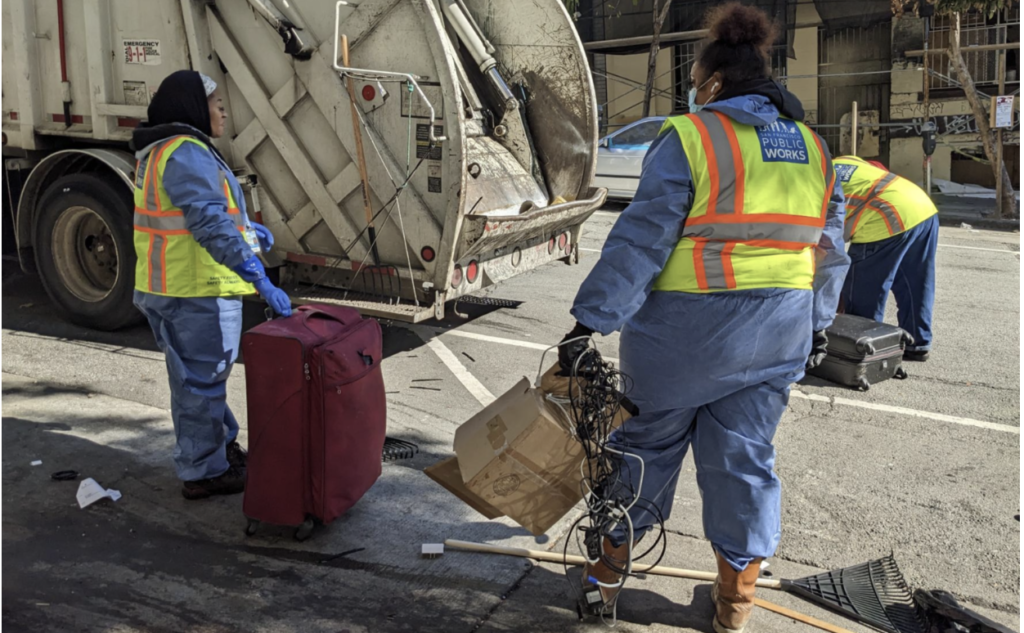The Supreme Court’s Friday decision to reverse the Ninth Circuit Court of Appeals’ verdict on Grants Pass v. Johnson shouldn’t derail the ACLU’s ongoing lawsuit against the city of San Francisco, according to lawyers for the plaintiffs.
The lawsuit was filed by the ACLU Foundation of Northern California, the Lawyers’ Committee for Civil Rights of the San Francisco Bay Area, and the law firm Latham & Watkins LLP on behalf of San Francisco’s Coalition on Homelessness in Sept. 2022.

According to the ACLUNC’s website, the case was prompted as a result of the city of San Francisco and Mayor London Breed’s “efforts to criminalize homelessness through an array of brutal policing practices that violate the constitutional rights of unhoused San Franciscans.” The lawsuit argues that the city is in violation of its own policies regarding the treatment of its unhoused citizens.
The legal complaint against the city cited “…[Its] decades-long failure to adequately invest in affordable housing and shelter [which] has left many thousands of its residents unhoused, forcing them to use tents and vehicles as shelter. In the face of this mounting crisis, the City has marshalled significant resources toward unlawful and ineffective punishment rather than affordable housing and shelter.”
This case involves 13 claims against Breed and the city, only one of which might be dropped after the Supreme Court’s Friday verdict. “[In] our lawsuit, only one of the 13 claims was built off of Martin v. Boise and Grants Pass. For certain, the other claims remain,” John Do, a Senior Attorney for the ACLU’s Racial and Economic Justice Program, told us.
The lawsuit brought against San Francisco does not only seek to ensure the city follows its own legislation in relation to the treatment of its homeless residents, but also their belongings.
Do and Nisha Kashyap, a program director on the Racial Justice Team for the LCCRSF, led a webinar together analyzing the Grants Pass case and its potential impacts on San Francisco. In the webinar, Kashyap said:
Between Jan. 1 and June, 2021, San Francisco created only 195 bag-and-tag records to document homeless people’s survival belongings that were seized by the city. In the same time period, the city displaced at least 1,282 unhoused residents by conducting 83 formal [Healthy Streets Operation Center (HSOC)] sweeps. We documented dozens upon dozens of incidents of the city destroying everything from prosthetics to cherished family belongings.
Do told 48 Hills, “[The city’s preliminary injunction] not only concerned San Francisco’s enforcement of its anti-homeless anti-sit-lie laws, but also ensured that San Francisco would not… destroy people’s belongings: People’s medical equipment, their survival gear, personal mementos and the like.”
The city was issued a preliminary injunction to prevent them from making further encampment sweeps without offers of shelter by a lower court. The injunction was then affirmed by the 9th Circuit on Jan. 11, 2024.
According to the presentation provided in the webinar:
In a three-year period before the lawsuit, the [San Francisco Police Department (SFPD)] cited or arrested 3,000 homeless residents for sit/lie/lodging offenses, and the city could not show that those thousands of individuals had access to shelter before they were cited or arrested.
Additionally, “San Francisco conceded in court that the city is thousands of shelter beds short. The city reported… being 2,674 beds short in 2021 in the lead up to our lawsuit.
Kashyap said:
It’s also important to know that the city conceded that at the time the lawsuit was filed, there was no voluntary means for individuals to seek shelter on their own. The shelter waitlist, the someday shelter lines and other mechanisms for unhoused people to directly access shelter were ended at the onset of the pandemic and had not been restarted at the time the preliminary injunction was being litigated.
This means that many of those thousands of people who were cited, arrested or threatened with citation or arrest were threatened with criminal enforcement even when they had no means of accessing shelter on their own. Since the preliminary injunction, the city has reopened the shelter waitlist system, and when I checked last night, the waitlist was over 100 people, which just underscores the scarcity in the system, and how there is simply not enough shelter to meet the needs of San Francisco’s unhoused residents.
Beyond the case against San Francisco, Grants Pass v. Johnson inspired other worries for Kashyap. She told us, “I think that there’s a real concern that… [now] we’ll see a race to the bottom in cities doing more and more punitive things to try and push these folks out of their communities. It’s always important to remember that the folks who are experiencing homelessness in our communities were housed in our communities before they became homeless.”
To Kashyap’s point, Breed seems emboldened by the Supreme Court’s verdict.
As reported by the San Francisco Chronicle:
Mayor London Breed addressed her plans moving forward at a City Hall news conference on Friday. “My hope is that we can clear… all [tents],” said Breed, according to the Chronicle. “With this opportunity, we’ll be able to do more to clean and clear our streets, especially for those who are refusing shelter and services.”
Do told 48 Hills that “Moving forward, San Francisco could try to continue on a path of a really expensive, ineffective law enforcement response. That’s up to them.”
“Our concern, however” he continued, “is that they haven’t kept their word in the past, and we need to make sure we do in the future— that’s [reliant on] everybody, not just on folks involved in this lawsuit, but everyday citizens to ensure that our public officials, our elected leaders, actually are accountable to resolving our homelessness crisis through effective means, which of course is actually providing increased services and housing opportunities for our people, not… using law enforcement.”






